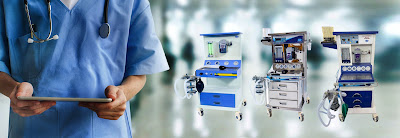When you're scheduled for surgery in Delhi, you may not give much thought to the complex medical equipment that will ensure your comfort and safety during the procedure. Among the most critical pieces of equipment in the operating room is the anesthesia machine. These machines are a crucial part of modern medicine, allowing skilled anesthesiologists to administer and monitor anesthesia with precision and care. In this blog post, we'll take a behind-the-scenes look at how anesthesia machines work, shedding light on the essential role they play in your surgery experience. We'll also discuss the role of Anaesthesia workstation exporters in Delhi in ensuring the availability of these vital machines.
The Anatomy of an Anaesthesia Machine
An Anaesthesia machine,
often referred to as an Anaesthesia machine or Anaesthesia workstation, is a
complex piece of equipment designed to deliver a precise and controlled mixture
of gases to a patient before, during, and after surgery. Let's delve into the
key components and how they work together to keep you comfortable and safe
during surgery.
Gas
Sources: Anesthesia machines are connected to various gas
sources, such as oxygen, nitrous oxide, and medical air. These gases are stored
in separate tanks and are essential for the delivery of anesthesia. The mixing
and blending of these gases are controlled to ensure the right composition for
the patient.
Gas
Flow Control: The machine regulates the flow of gases
from the tanks to maintain a constant, predetermined flow rate. The anesthesiologist
can adjust these flow rates to control the amount of anesthetic gas delivered
to the patient.
Vaporizer:
Anesthetic agents are typically in a liquid form and need to be vaporized
before being administered to the patient. Vaporizers are an essential part of
the anesthesia machine and convert the liquid anesthetic into a gas form that
can be inhaled by the patient.
Breathing
Circuit: The breathing circuit connects the patient to the
anesthesia machine and allows the delivery of the anesthetic gas. It includes
components like a breathing tube, a one-way valve, and a reservoir bag.
Patient
Monitoring: Modern anesthesia machines are equipped
with advanced monitoring systems that measure vital signs, including heart
rate, blood pressure, oxygen saturation, and exhaled carbon dioxide levels.
This allows the anesthesiologist to continuously assess the patient's condition
and make real-time adjustments to the anesthesia.
The Role of Anesthesia
Workstation Exporters in Delhi
Delhi is a major hub
for medical equipment manufacturing and export, including anesthesia machines.
Anesthesia workstation exporters in Delhi play a pivotal role in ensuring that
these vital machines are available not only in hospitals across the city but
also around the world. These exporters are responsible for producing
high-quality anesthesia machines that meet international standards and
regulations. They help provide healthcare facilities with the essential
equipment needed to perform surgeries and medical procedures safely and
effectively.
In addition to
manufacturing and exporting anesthesia machines, these companies often offer
maintenance and servicing to ensure that the machines remain in excellent
working condition. Regular maintenance is crucial to prevent equipment malfunctions
and to guarantee the safety of patients during surgery.
Anesthesia machines are
a fundamental part of modern surgical procedures, allowing patients to undergo
surgery safely and comfortably. Understanding how these machines work and the
role of anesthesia workstation exporters in Delhi in providing them is
essential for the healthcare industry. These machines, equipped with advanced
technology and safety features, are a testament to the progress in medical
science, making surgery a safer and more precise experience for patients in
Delhi and beyond. The next time you or a loved one undergoes surgery, you can
rest assured that the anesthesia machine is diligently working behind the
scenes to ensure a successful procedure.

No comments:
Post a Comment